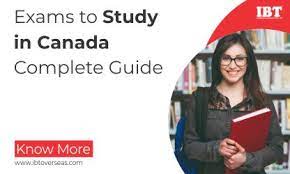Studying in Canada after completing 12th grade is a popular option for many Indian students. Canada is known for its high-quality education system, diverse culture, and excellent standard of living. Here are the key steps and considerations for Indian students looking to study in Canada after 12th:
Choose Your Course and University

Research and decide on the course you want to pursue and the university you want to attend. Consider factors such as the reputation of the institution, the specific program, location, and potential career opportunities.
Check Admission Requirements
Different universities and programs have varying admission requirements. Make sure you meet the academic criteria, language proficiency requirements (usually IELTS or TOEFL), and any other specific requirements for your chosen program.
Prepare for Language Proficiency Tests

Most Canadian universities require proof of English proficiency through tests like IELTS or TOEFL. Prepare for these tests and achieve the required scores.
Apply for Admission
Once you’ve selected a university and course, submit your application online. Ensure that you provide all necessary documents, including academic transcripts, letters of recommendation, and a statement of purpose.
Obtain a Study Permit
After receiving an acceptance letter from the university, you need to apply for a study permit through the Immigration, Refugees and Citizenship Canada (IRCC) website. Make sure to check the processing times and apply well in advance.
Financial Planning
Assess the cost of living and tuition fees in Canada. Create a financial plan to cover your expenses, including tuition, accommodation, food, transportation, and other miscellaneous costs.
Health Insurance
Health insurance is mandatory for international students in Canada. Ensure you have the required health coverage either through the university or a private insurance provider.
Arrival and Orientation
Once you obtain your study permit, plan your travel to Canada. Attend the orientation sessions organized by the university to familiarize yourself with the campus, services, and academic requirements.
Part-Time Work
As an international student, you are allowed to work part-time during your studies. Check the regulations and guidelines for international students’ employment in Canada.
Post-Graduation Work Permit (PGWP)
After completing your studies, you may be eligible for a Post-Graduation Work Permit, allowing you to work in Canada for a specified period. This can be an excellent opportunity to gain Canadian work experience.
Remember that immigration and education policies may change, so it’s crucial to stay updated on the latest requirements and regulations. Consult with the Canadian embassy or a reliable immigration consultant for the most accurate and current information.
Scholarships and Financial Aid
Explore scholarship opportunities offered by Canadian universities, the Canadian government, and private organizations. Many institutions provide financial aid or merit-based scholarships that can significantly reduce your overall expenses.
Accommodation Options
Consider your housing options, such as on-campus residences, off-campus apartments, or homestays. Different universities may have varying accommodation facilities, and choosing the right option can impact your overall experience.
Cultural Adaptation and Support Services:
Be prepared for cultural differences and take advantage of support services provided by the university. Many institutions offer orientation programs, counseling services, and cultural integration activities to help international students adjust to life in Canada.
Networking Opportunities
Canada is known for its multicultural environment. Engage in networking events, student clubs, and community activities to build connections with fellow students, professors, and professionals. Networking can be beneficial for your academic and career growth.
Internship and Co-op Programs
Explore internship and co-op opportunities related to your field of study. Many Canadian universities have strong ties with industries, offering students the chance to gain practical work experience as part of their academic curriculum.
Health and Wellness Services
Familiarize yourself with the health and wellness services provided by the university. Access to healthcare and mental health support is essential, and universities often have dedicated services to assist students with their well-being.
Public Transportation and Student Discounts
Learn about the public transportation options available in the city where your university is located. Many cities have efficient public transit systems, and as a student, you may be eligible for discounted transportation passes.
Language and Integration Programs
If English is not your first language, consider enrolling in language enhancement programs offered by the university. These programs can help improve your language skills and facilitate a smoother academic experience.
Explore Canada
Take advantage of your time in Canada to explore the diverse landscapes and cultural richness of the country. Plan trips during breaks to visit different provinces, experience various climates, and immerse yourself in the beauty of Canada.
Student Visa Renewal
Understand the process for renewing your student visa if your program extends beyond the initial validity period. Ensure that you maintain compliance with immigration regulations to avoid any legal issues during your stay.
Post-Graduation Opportunities:
Research the opportunities available to international students after graduation
Canada has favorable immigration policies for skilled workers, and obtaining Canadian work experience during your studies can enhance your prospects for permanent residency.
Maintain Good Academic Standing
Stay focused on your studies and maintain good academic standing. Canadian institutions often have high academic standards, and maintaining good grades can open doors to additional opportunities and future success.
Community Engagement

Get involved in community service or volunteer activities. Contributing to the local community not only enriches your experience but also reflects positively on your personal and professional profile.
Cultural Etiquette

Familiarize yourself with Canadian cultural etiquette, social norms, and customs. Understanding and respecting cultural differences will help you integrate better into the local community.
Conclusion
Studying in Canada after 12th grade is a transformative experience that goes beyond academics. By considering various aspects such as finances, cultural adaptation, and post-graduation opportunities, you can make the most of your educational journey in Canada. Be proactive, seek support when needed, and embrace the opportunities for personal and professional growth that studying in Canada offers.




